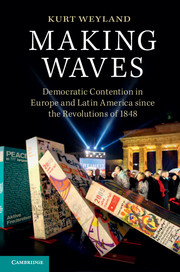Book contents
- Frontmatter
- Contents
- Acknowledgments
- 1 Introduction: Puzzling Trends in Waves of Contention
- 2 A New Theory of Political Diffusion: Cognitive Heuristics and Organizational Development
- 3 Organizational Development and Changing Modes of Democratic Contention
- 4 The Tsunami of 1848: Precipitous Diffusion in Inchoate Societies
- 5 The Delayed Wave of 1917–1919: Organizational Leaders as Guides of Targeted Contention
- 6 The Slow but Potent “Third Wave” in South America: The Prevalence of Negotiated Transitions
- 7 Crosscurrents of the Third Wave: Interorganizational Competition and Negotiation in Chile
- 8 Theoretical Conclusions and Comparative Perspectives
- Bibliography
- Name Index
- Subject Index
7 - Crosscurrents of the Third Wave: Interorganizational Competition and Negotiation in Chile
Published online by Cambridge University Press: 05 June 2014
- Frontmatter
- Contents
- Acknowledgments
- 1 Introduction: Puzzling Trends in Waves of Contention
- 2 A New Theory of Political Diffusion: Cognitive Heuristics and Organizational Development
- 3 Organizational Development and Changing Modes of Democratic Contention
- 4 The Tsunami of 1848: Precipitous Diffusion in Inchoate Societies
- 5 The Delayed Wave of 1917–1919: Organizational Leaders as Guides of Targeted Contention
- 6 The Slow but Potent “Third Wave” in South America: The Prevalence of Negotiated Transitions
- 7 Crosscurrents of the Third Wave: Interorganizational Competition and Negotiation in Chile
- 8 Theoretical Conclusions and Comparative Perspectives
- Bibliography
- Name Index
- Subject Index
Summary
Chapter 6 demonstrated the noteworthy complexity of the third wave in Latin America, especially by focusing on the input side of diffusion and highlighting the confluence of diverse external stimuli. This variety of options in turn intersected with the ideological differentiation of political organizations, which shaped the reception side of diffusion. As various political groupings gravitated toward different external precedents and models, disagreements and conflicts arose over the best strategy to follow. The resulting discussions hindered opposition unity and slowed down the advance of emulative regime contention. But the availability of various strategies also allowed for learning from political experiences and thus enhanced the chances that democratization efforts would eventually come to fruition. As unpromising options sooner or later lost support, large sectors of the opposition came to embrace an approach that managed to dislodge the dictatorship. External backers of democratization helped to create this opposition unity, a crucial precondition for effective pressure on authoritarian rulers. In sum, the broader offerings at the input side of diffusion, the debates over their domestic processing, and the gradual convergence among opposition forces help explain the particularly slow speed but also the high success of the third wave in South America.
The case that most clearly exemplifies the special features of this diffusion process, especially on the reception side, is Chile. That country had long had a well-structured, programmatically oriented multiparty system that covered the whole ideological spectrum, from the hard-core right to the radical left. Accordingly, different political forces found different external models appealing; in fact, what some politicians admired as a model, others abhorred as a deterrent. Chile’s transition thus reveals with particular clarity the discussions and conflicts at the reception side of diffusion, which Chapter 6 mentioned only in brief overview. For the present effort in theory-building, the Chilean case is especially instructive because it sheds bright light on the interorganizational dynamics discussed at the end of Chapter 2; the causal mechanisms at work and their complex interweaving appear with particular clarity in this case. The following analysis of Chile’s tortuous transition constitutes a plausibility probe for that part of my complex argument.
- Type
- Chapter
- Information
- Making WavesDemocratic Contention in Europe and Latin America since the Revolutions of 1848, pp. 192 - 223Publisher: Cambridge University PressPrint publication year: 2014
- 1
- Cited by



